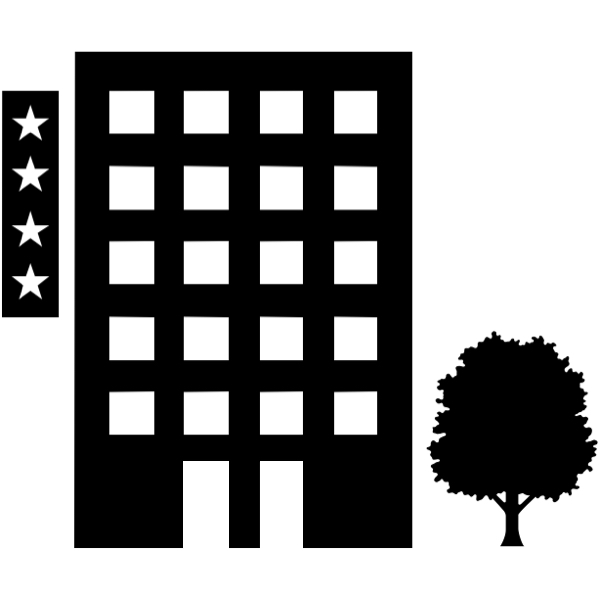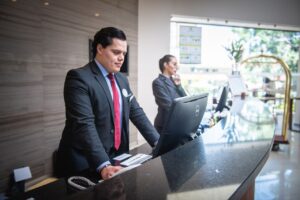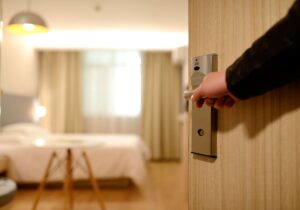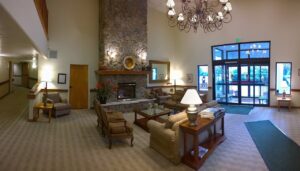Welcome to Online Hotel Management!
Discover the art of seamless hotel operations with our expertise.
From elevating guest services to optimizing staff management, marketing strategies, and financial efficiency – we’re your partner in ensuring hotels run like clockwork.
Explore the core of hospitality success right here!

What is Hotel Management?
Hotel Management involves overseeing the daily operations of a hotel to ensure smooth functioning and guest satisfaction.
It includes tasks such as managing staff, handling reservations, coordinating events, maintaining facilities, and addressing customer concerns to create a positive and efficient hospitality experience.
Staff Management
Staff management in hotel management involves supervising and coordinating the activities of the hotel’s personnel. This includes tasks such as recruitment, training, scheduling, and performance evaluation.
Effectively managing staff ensures a productive and cohesive team, contributing to the overall success of the hotel’s operations.
- Why High Retention Rates Are Crucial for Small and Medium-Sized Hotels
- Boosting Employee Motivation in Hotels – Tips & Trix
- Optimizing Staff Scheduling for Smooth Operations
- Mastering Effective Hotel Staff Management: 10 Tips for Success
Recruitment and Hiring
Recruitment and hiring in staff management refer to the process of identifying, attracting, and selecting qualified individuals to fill vacant positions within the hotel. This is crucial in hotel management because the quality of the staff significantly influences the guest experience and overall hotel performance.
A well-executed recruitment and hiring process ensure that the hotel employs skilled and service-oriented individuals who contribute positively to guest satisfaction and the overall success of the establishment.
Training and Development
Training and development in staff management involve providing employees with the necessary skills, knowledge, and competencies to perform their roles effectively.
Explore our featured online hotel management courses to take the next step.
In hotel management, developing the human resources is crucial. It enhances the quality of service provided to guests, contributing to a positive guest experience.
Staff training boosts employee morale and job satisfaction, leading to higher retention rates. Ongoing training also ensures that staff members stay updated on industry trends and best practices, ultimately improving the hotel’s competitiveness in the market.
Performance Evaluation
Performance evaluation in hotel staff management is the process of assessing an employee’s job performance against established criteria and goals.
This provides feedback to employees, helping them understand their strengths and areas for improvement. It also assists in identifying training needs and career development opportunities.
In short, performance evaluations contribute to maintaining high service standards by recognizing and rewarding exceptional performance or addressing issues promptly.
Employee Motivation and Engagement
Employee motivation and engagement involve fostering a positive work environment and encouraging staff commitment. It enhances productivity and service quality by ensuring a motivated and engaged workforce.
Motivated staff also contributes to lower turnover rates, reducing recruitment and training costs. Plus, motivated and engaged employees are more likely to provide excellent customer service, positively impacting guest satisfaction and the overall success of the hotel.
Staff Scheduling and Shift Management
Staff scheduling and shift management entail organizing and assigning work hours for employees. In hotel management, this involves creating efficient schedules to ensure adequate coverage during peak times and managing shifts effectively.
Proper staff scheduling is vital for maintaining smooth operations, optimizing labor costs, and meeting guest needs. It requires balancing workload, considering employee preferences, and adapting to changing demands to ensure a well-staffed and responsive team.
Guest Services
Guest services in hotel management involve addressing the needs and requests of guests during their stay. It encompasses services like check-in, room accommodations, concierge assistance, and resolving guest inquiries or issues promptly to ensure a positive guest experience.
The services offered differ between different types of hotel.
Reservation Management
Reservation management refers to handling and overseeing the hotel booking and reservation processes for guests. It involves tasks such as recording reservations, managing room availability, and ensuring accurate and timely communication with guests.
The goal with reservation management is to optimize room occupancy, streamline the check-in process, and enhance overall guest satisfaction.
Check-In and Check-Out Procedures
Check-in and check-out procedures in hotel management pertain to the processes of welcoming guests upon arrival and ensuring a smooth departure when their stay concludes. It involves verifying guest information, assigning rooms, processing payments, and addressing any specific requests or concerns.
Efficient check-in and check-out procedures are essential for providing a seamless and positive experience for guests during their stay.
Concierge Services
Concierge services in guest services involve offering personalized assistance and information to guests. This includes providing recommendations for local attractions, arranging transportation, booking reservations, and addressing special requests.
The goal is to enhance the guest experience by offering convenient and tailored services that contribute to their overall satisfaction during their stay.
Room Service and Dining
Room service and dining in hotel management refer to the provision of food and beverage services to guests in their rooms.
Room service offers convenience and flexibility to guests who prefer to dine in the comfort of their rooms. It contributes to additional revenue for the hotel through in-room dining orders.
A well-managed room service and dining experience enhance overall guest satisfaction, adding to the positive image of the hotel.
Housekeeping and Maintenance
Housekeeping in guest services involves the cleaning and maintenance of guest rooms and common areas within the hotel. Maintenance focuses on ensuring the proper functioning and upkeep of the hotel’s facilities and equipment.
Together, they play a crucial role in creating a clean, safe, and welcoming environment for guests, contributing significantly to their overall satisfaction and the hotel’s reputation.
Financial Management
Financial management in hotel management involves overseeing the monetary aspects of the establishment. It includes tasks such as budgeting, accounting, and financial analysis.
The primary goal is to ensure effective financial planning, control expenses, and optimize revenue to contribute to the overall profitability and sustainability of the hotel.
Budgeting
Budgeting involves setting financial goals and allocating resources to various departments within the hotel. It includes estimating revenues and outlining anticipated expenses.
By creating a detailed budget, the hotel can manage its financial resources efficiently, control costs, and allocate funds strategically.
Forecasting
Forecasting is the process of predicting future financial trends based on historical data and current market conditions. In the hotel industry, forecasting helps in anticipating demand for rooms, services, and amenities.
Accurate forecasting enables the hotel to make informed decisions regarding pricing strategies, staffing levels, and resource allocation to meet or exceed anticipated demand.
Revenue Management
Revenue management in hotel management involves strategically optimizing the pricing and distribution of rooms and services to maximize overall revenue. It includes analyzing market demand, setting pricing strategies, and adjusting rates based on various factors such as seasonality, occupancy levels, and competitor pricing.
The primary objective of revenue management is to sell the right room, to the right guest, at the right time, and for the right price.
Cost Control
Cost control focuses on regulating and minimizing various costs associated with hotel operations. It includes managing expenses related to labor, supplies, utilities, and other operational aspects.
By implementing efficient processes and identifying areas for cost savings, hotels can enhance their overall financial performance.
Expense Management
Expense management encompasses the systematic control and oversight of all expenditures within the hotel. This involves budgeting, tracking, and analyzing expenses to ensure they align with the financial goals and priorities of the establishment.
Effective expense management helps maintain a balance between cost efficiency and delivering high-quality services to guests.
Financial Reporting
Financial reporting in hotel management involves the systematic communication of the financial performance and status of the establishment. It includes the preparation and presentation of financial statements and reports that provide a comprehensive overview of the hotel’s economic activities.
Key components of financial reporting include income statements, balance sheets, cash flow statements, and various financial analyses. These reports offer stakeholders, such as management, investors, and creditors, insights into the hotel’s profitability, liquidity, and overall financial health.
Financial Compliance
In hotel management, financial compliance refers to adhering to relevant laws, regulations, and industry standards governing financial practices. It involves ensuring that the hotel’s financial activities align with legal requirements and ethical standards.
Key aspects of financial compliance includes legal regulations, industry standards, internal policies and ethical practices, among others.
Legal Regulations: Compliance entails following national and local laws related to taxation, labor practices, financial reporting, and other financial aspects. This includes staying updated on changes in regulations that may impact financial operations.
Industry Standards: Hotels often need to comply with industry-specific standards and best practices. This may include adhering to accounting standards, ethical guidelines, and financial reporting norms applicable to the hospitality sector.
Internal Policies: Establishing and following internal financial policies and procedures is crucial for compliance. This may involve creating guidelines for budgeting, expenditure approvals, and financial reporting within the hotel.
Ethical Practices: Compliance also extends to maintaining ethical practices in financial management. This includes transparency in financial reporting, avoiding fraudulent activities, and upholding integrity in financial dealings.
Taxation
Taxation in hotel management involves the compliance with local, regional, and national tax regulations to ensure proper reporting and payment of taxes.
This includes various types of taxes such as income tax, sales tax, and occupancy tax, among others.
Income Tax: Hotels are subject to income tax on their earnings, which includes revenue from room bookings, food and beverage services, and other sources. Proper accounting and reporting are essential to fulfill income tax obligations.
Sales Tax: Sales tax is levied on certain goods and services, including accommodations and meals provided by hotels. Compliance with sales tax regulations, including accurate collection and remittance, is crucial to avoid legal issues.
Occupancy Tax: Many regions impose occupancy taxes on hotel room rentals. This tax is typically collected from guests and remitted to the appropriate authorities. Compliance with occupancy tax regulations is essential to avoid penalties.
Marketing and Sales
Marketing and sales in hotel management involve promoting and selling the hotel’s products and services to attract guests and maximize revenue. This includes creating effective marketing strategies, utilizing various channels to reach potential customers, and employing sales tactics to secure bookings and generate revenue.
The goal is to enhance the hotel’s visibility, attract a diverse clientele, and optimize occupancy rates for increased profitability.
- How to Pitch and Collaborate with Hotels as an Influencer [FAQ]
- How High-Quality Hotel Photos Strengthen Your Brand and Boost Bookings
Branding
Branding in hotel marketing involves establishing a distinctive identity for the hotel, encompassing its name, logo, and overall image.
Effective branding creates a recognizable and memorable image for the hotel. It helps build trust and loyalty among guests, conveying the hotel’s unique characteristics and value proposition.
A strong brand is essential for attracting and retaining customers in a competitive market.
Brand Positioning
Brand positioning is the strategic placement of the hotel in the market relative to competitors. It involves defining the hotel’s place in the minds of potential guests. This could be based on factors like luxury, affordability, location, or unique offerings.
A well-defined positioning strategy helps the hotel stand out, target the right audience, and communicate its competitive advantages.
Advertising
Advertising includes paid promotional efforts through various channels such as print, online platforms, social media, and television. The goal is to reach a wide audience and showcase the hotel’s offerings, special promotions, or unique features.
Promotion
Promotion involves a broader set of activities, including special deals, discounts, loyalty programs, and public relations efforts. It aims to create a positive image, generate interest, and encourage guests to choose the hotel over competitors.
Online Marketing
Online marketing in hotel management refers to the use of digital channels and platforms to promote and sell the hotel’s products and services. It encompasses a variety of online strategies and tactics to reach and engage potential guests.
Key Components of Online Marketing in Hotel Management:
- Website Optimization: Ensuring the hotel’s website is user-friendly, visually appealing, and optimized for search engines to enhance online visibility.
- Search Engine Marketing (SEM): Utilizing paid advertising on search engines to increase the hotel’s visibility when users search for relevant keywords.
- Search Engine Optimization (SEO): Implementing strategies to improve the website’s organic (non-paid) visibility on search engine results pages.
- Social Media Marketing: Leveraging social media platforms to connect with the target audience, share content, and promote special offers or events.
- Email Marketing: Engaging with past and potential guests through targeted email campaigns, newsletters, and promotional updates.
- Online Travel Agencies (OTAs): Collaborating with OTAs to list the hotel’s offerings and reach a broader audience through popular booking platforms.
- Content Marketing: Creating and sharing relevant and valuable content, such as blog posts, articles, or videos, to attract and engage the hotel’s target audience.
Social Media
Social media in hotel management refers to the use of various online platforms to engage with the audience, build brand awareness, and promote the hotel’s products and services.
Key Aspects of Social Media in Hotel Management:
- Platform Presence: Establishing and maintaining a presence on popular social media platforms such as Facebook, Instagram, Twitter, and LinkedIn.
- Content Sharing: Regularly sharing engaging and visually appealing content, including hotel photos, videos, and posts, to showcase the hotel’s amenities, events, and special offers.
- Audience Interaction: Actively engaging with the audience by responding to comments, messages, and reviews. This interaction helps build relationships and enhance the guest experience.
- Promotions and Contests: Running promotions, contests, and giveaways to incentivize audience participation and increase brand visibility.
- Influencer Collaborations: Partnering with social media influencers or bloggers to extend the hotel’s reach and leverage their followers for promotional purposes.
- Advertising: Utilizing paid advertising features on social media platforms to target specific demographics and promote the hotel to a wider audience.
Sales Strategies and Techniques
Sales strategies in hotel management involve the systematic planning and execution of approaches to increase revenue through room bookings, events, and other services.
These strategies encompass various methods and tactics aimed at attracting guests and boosting sales.
Examples of Sales Strategies:
- Target Market Identification: Identifying and defining the specific market segments that the hotel aims to attract, tailoring sales efforts to meet the needs and preferences of these segments.
- Pricing Strategies: Implementing effective pricing strategies, including dynamic pricing, packages, and promotions, to maximize revenue and occupancy rates.
- Partnerships and Collaborations: Forming strategic partnerships with local businesses, travel agencies, or event organizers to expand the reach and attract a broader clientele.
- Direct Sales: Focusing on direct sales efforts through the hotel’s website, email campaigns, and phone bookings to reduce reliance on third-party channels.
Examples of Sales Techniques:
- Relationship Building: Establishing and nurturing relationships with potential and repeat clients, fostering loyalty and increasing the likelihood of future bookings.
- Effective Communication: Communicating the unique selling points of the hotel, including amenities, services, and special offerings, to potential guests.
- Upselling: Encouraging guests to upgrade their reservations, add-on services, or choose premium options to enhance their overall experience and increase revenue.
- Cross-Selling: Promoting additional services or amenities, such as spa treatments, dining options, or event packages, to guests during the booking process or their stay.
Customer Relationship Management
Customer Relationship Management (CRM) in hotel management involves the systematic approach to building and maintaining positive relationships with guests throughout their journey with the hotel.
CRM focuses on understanding and meeting the needs of guests to enhance satisfaction and foster loyalty.
Key Aspects of CRM in Hotel Management:
- Guest Profiling: Creating detailed profiles for individual guests, tracking preferences, special requests, and previous interactions to personalize future experiences.
- Communication: Implementing effective communication strategies through various channels, including emails, surveys, and social media, to stay connected with guests before, during, and after their stay.
- Feedback Management: Soliciting and actively managing guest feedback to address concerns, improve services, and demonstrate responsiveness to guest opinions.
- Loyalty Programs: Implementing loyalty programs to reward repeat guests with exclusive benefits, discounts, or special privileges, encouraging ongoing patronage.
- Data Analytics: Utilizing data analytics to gain insights into guest behavior, preferences, and trends, enabling targeted marketing efforts and personalized service delivery.
Importance of CRM in Hotel Management:
- Guest Retention: CRM strategies contribute to guest retention by building a sense of loyalty and satisfaction, reducing the likelihood of guests choosing competitors.
- Personalization: Personalizing guest experiences based on their preferences and history enhances customer satisfaction and increases the likelihood of repeat business.
- Reputation Management: Addressing guest concerns promptly and positively influences online reviews, contributing to a positive reputation and attracting new guests.
- Increased Revenue: Repeat business and positive word-of-mouth generated through effective CRM efforts can lead to increased revenue and profitability.
- Competitive Edge: A well-implemented CRM system gives the hotel a competitive edge by demonstrating a commitment to customer satisfaction and delivering personalized services.
Operations Management
Operations management in hotel management involves overseeing and optimizing the daily activities and processes to ensure the efficient functioning of the hotel. It includes tasks such as staffing, housekeeping, maintenance, and guest services.
The goal is to streamline operations, enhance guest satisfaction, and contribute to the overall success of the hotel.
Front Office Operations
Front office operations in hotel management involve managing the guest-facing areas and activities, including reception, reservations, and guest services. It encompasses tasks such as check-in and check-out, handling reservations, providing information to guests, and managing inquiries.
The front office is crucial for creating a positive first impression, delivering excellent customer service, and ensuring a smooth and efficient guest experience.
Housekeeping Operations
Housekeeping operations in hotel management pertain to the management and coordination of cleaning and maintenance activities within the hotel. This includes tasks such as cleaning guest rooms, maintaining common areas, managing laundry services, and ensuring overall cleanliness and hygiene.
Effective housekeeping operations are essential for creating a comfortable and welcoming environment for guests, contributing to their overall satisfaction and the hotel’s reputation.
Food and Beverage Operations
Food and beverage operations in hotel management involve managing and overseeing the various aspects of the hotel’s dining services. This includes the restaurant, bars, banquet facilities, and room service.
The focus in food and beverage operations is on providing high-quality offerings, managing inventory, ensuring compliance with health and safety regulations, and delivering a positive dining experience for guests.
Effective food and beverage operations contribute significantly to guest satisfaction and the overall success of the hotel.
Maintenance and Engineering
Maintenance and engineering in the context of operations management for a hotel involve overseeing the physical infrastructure, equipment, and systems to ensure their proper functioning and upkeep. This includes tasks such as preventive maintenance, repairs, and managing the hotel’s mechanical and electrical systems.
The goal is to maintain a safe and comfortable environment for guests, prolong the life of assets, and minimize downtime.
Effective maintenance and engineering operations are critical for the overall efficiency and functionality of the hotel.
Security and Safety Procedures
Security and safety procedures in operations management for a hotel involve implementing measures to protect guests, staff, and property from potential risks and ensuring compliance with safety regulations. This includes establishing protocols for emergency situations, monitoring surveillance systems, conducting security checks, and training staff in safety procedures.
The primary objective is to create a secure and safe environment for everyone within the hotel premises.
Effective security and safety procedures are essential components of operations management, contributing to the overall well-being and satisfaction of guests and staff.
Hotel Facility Management
Hotel Facility Management involves overseeing and optimizing the physical infrastructure, services, and amenities of the hotel. It includes tasks such as maintenance, housekeeping, security, and ensuring the efficient operation of all facilities to enhance the overall guest experience and contribute to the hotel’s success.
Room Types and Amenities
Room types and amenities in Hotel Facility Management pertain to the diverse accommodations offered to guests and the additional services provided to enhance their stay.
- Room Types: Varied categories of guest rooms, such as standard, deluxe, suites, etc., each offering different features and space configurations to cater to the preferences and needs of diverse guests.
- Amenities: Additional services and facilities beyond basic accommodations, including features like Wi-Fi, room service, fitness centers, swimming pools, and other offerings that contribute to guest comfort and satisfaction during their stay.
Efficient management of these aspects ensures a positive guest experience.
Standard Rooms
Standard rooms refer to the basic and most common type of guest accommodations available in a hotel. These rooms typically provide essential amenities and features, offering a comfortable stay at an affordable or standard rate.
Standard rooms are designed to meet the basic needs of guests, providing a place to sleep and relax.
The specific features and size of standard rooms may vary among hotels, but they generally serve as the baseline accommodation option.
Suites
Suites in the context of hotel accommodations refer to larger and more luxurious rooms that often include a separate living area, bedroom, and additional amenities beyond what standard rooms offer.
Suites are designed to provide guests with more space, comfort, and an enhanced experience during their stay. They are typically suitable for guests seeking a higher level of luxury or those requiring additional space for various purposes, such as business meetings or extended stays.
Suites may vary in size, layout, and included amenities, offering a more premium option compared to standard rooms.
Specialty Rooms
Specialty rooms in hotel management refer to unique and themed accommodations that offer distinct features or experiences beyond standard and suite options. These rooms are designed to cater to specific preferences or provide a particular atmosphere, making them stand out from typical guest rooms.
Specialty rooms can include themed suites, rooms with specific views (such as ocean-view rooms), honeymoon suites, or accommodations with special amenities like private hot tubs or unique decor.
The goal is to provide guests with a more personalized and memorable experience that aligns with their preferences or special occasions.
The features of specialty rooms can vary widely, offering a diverse range of choices to cater to different guest preferences.
In-room Entertainment
In-room entertainment in the context of hotel facilities refers to the amenities and services provided within guest rooms to keep guests entertained during their stay.
It typically includes:
- Television: Offering a variety of channels, including movies, news, and entertainment options.
- Streaming Services: Providing access to streaming platforms for movies, TV shows, and other content.
- Audio Systems: Access to music channels or audio systems for guests’ enjoyment.
- Internet Access: High-speed internet connectivity for guests to stay connected and stream content.
- In-room Movies: On-demand movie services for guests to enjoy at their convenience.
The goal of in-room entertainment is to enhance the overall guest experience by providing a range of options for relaxation and amusement within the privacy of their room.
Bathroom Facilities
Bathroom facilities include fixtures such as a toilet, sink, and shower or bathtub.
The design and features of bathroom facilities may vary, with some rooms offering additional luxuries like Jacuzzi tubs.
Toiletries
Toiletries comprise complimentary personal care items provided to guests, typically including soap, shampoo, conditioner, body lotion, and sometimes additional items like toothbrushes, toothpaste, and shower caps.
The provision of high-quality toiletries contributes to guest satisfaction and convenience during their stay.
Room Service
Room service in hotel management refers to the service where guests can order and have food, beverages, or other amenities delivered directly to their hotel room. This service is designed to provide convenience and flexibility to guests who prefer to dine or enjoy services in the privacy of their rooms.
Key aspects of room service include:
- Menu Selection: Guests can choose from a menu of available food and beverage options.
- Delivery: The hotel staff delivers the selected items directly to the guest’s room.
- Timing: Room service is typically available during specific hours, allowing guests to order meals or snacks at their convenience.
Room service enhances the overall guest experience by offering a convenient dining option and personalized service within the comfort of the guest’s room.
Minibar
A minibar in hotel management is a small refrigerator or cabinet in a guest room stocked with a selection of beverages, snacks, and sometimes alcoholic drinks.
Guests can access items from the minibar during their stay, and charges are usually applied to their final bill based on consumption.
Key features of minibars include:
- Beverages: Soft drinks, water, juices, and sometimes alcoholic beverages like beer or wine.
- Snacks: Pre-packaged snacks such as nuts, chips, chocolates, and other treats.
- Pricing: Items in the minibar are typically priced higher than similar items available elsewhere, reflecting the convenience and immediate availability for guests.
Minibars provide guests with a convenient in-room option for refreshments, although some hotels are moving toward alternative models or eliminating minibars altogether in favor of other guest service approaches.
Public Areas
Public areas in hotel facility management refer to the communal spaces within the hotel that are accessible to all guests. These areas are designed to serve various purposes, providing spaces for socializing, relaxation, and convenience.
Efficient management of public areas is essential to create a welcoming and comfortable atmosphere for guests, contributing to their overall satisfaction with the hotel.
- The Role of the Reception Area in Hotel Facility Management
- The Importance of the Hotel Lobby in Guest Experience
Lobby
The hotel lobby is the main entry area of the hotel, serving as the focal point for guest arrivals and departures. It is a communal space designed for various purposes, including check-in and check-out processes, guest assistance, and socializing.
The lobby often features the reception desk, seating areas, and may include amenities such as a concierge desk, information kiosk, or a business center.
The design and ambiance of the lobby play a crucial role in creating a positive first impression for guests and setting the overall tone for their stay.
Reception
Reception, in the context of public areas in hotel facility management, refers to the area or desk within the hotel’s lobby where guests check in and check out. It is the primary point of contact for guests arriving at or departing from the hotel.
The reception area is staffed by hotel personnel, often known as receptionists or front desk agents, who handle guest registrations, provide information, and assist with various guest inquiries and requests.
The reception plays a central role in ensuring a smooth and welcoming experience for guests during their stay.
Restaurants and Bars
Restaurants and bars in hotel facility management refer to the dining and beverage establishments within the hotel premises. These areas are designed to cater to the culinary needs and preferences of guests, providing them with on-site dining options and social spaces.
- Hotel restaurants are dining spaces within the hotel where guests can enjoy meals. Restaurants may offer various cuisines, dining atmospheres, and menu options to cater to diverse tastes.
- Bars within the hotel provide a space for guests to enjoy beverages, including alcoholic and non-alcoholic drinks. Some hotels may have specialized bars, such as cocktail bars or wine bars.
On-site restaurants and bars enhance guest convenience by providing dining and socializing options within the hotel premises, eliminating the need for guests to venture outside. This contributes to an overall improved guest experience, offering diverse culinary choices and atmospheres for exploration.
Moreover, these establishments serve as crucial revenue sources for hotels, playing a pivotal role in the financial success of the establishment. Efficient management involves delivering quality food and beverage services, maintaining attractive atmospheres, and ensuring guest satisfaction.
Fitness Center
A fitness center refers to an on-site facility equipped with exercise and workout amenities for guests to engage in physical fitness activities during their stay. The fitness center typically includes exercise equipment such as treadmills, elliptical machines, weightlifting equipment, and sometimes additional features like yoga mats or group exercise areas.
The goal in terms of hotel management is to provide guests with the opportunity to maintain their fitness routines and promote a healthy lifestyle while staying at the hotel.
Efficient management of the fitness center involves maintaining equipment, ensuring cleanliness, and creating a welcoming environment for guests seeking exercise options.
Spa
A spa is a dedicated facility within the hotel premises that offers a range of health and wellness treatments and services. These services are designed to promote relaxation, rejuvenation, and overall well-being for guests during their stay.
Spa facilities often include treatment rooms for massages and beauty therapies, steam rooms, public hotel saunas, and sometimes additional amenities like jacuzzis or swimming pools.
Guests can indulge in various spa treatments, such as massages, facials, body scrubs, and other therapeutic services, contributing to a luxurious and pampering experience.
Efficient management of the spa involves providing skilled therapists, maintaining a serene atmosphere, and ensuring guest satisfaction with the spa services offered.
Swimming Pool and Outdoor Spaces
Swimming pools and outdoor spaces are crucial considerations in hotel management for several reasons:
- Guest Experience: Swimming pools and well-designed outdoor spaces enhance the overall guest experience, providing opportunities for relaxation, recreation, and enjoyment during their stay.
- Attraction for Guests: A well-maintained swimming pool and inviting outdoor areas can be significant attractions for guests when choosing a hotel. These amenities contribute to the hotel’s competitiveness in the market.
- Recreation and Wellness: Outdoor spaces, including pools, provide guests with options for physical activity, promoting wellness and a healthy lifestyle. This aligns with the growing trend of guests seeking holistic experiences during their travels.
- Aesthetic Appeal: Beautifully landscaped outdoor spaces and a well-designed pool area add to the aesthetic appeal of the hotel, creating a positive and inviting atmosphere for guests.
- Event Hosting: Outdoor spaces can be utilized for events, gatherings, or special occasions, offering additional revenue streams for the hotel and expanding its services.
Efficient management involves maintaining cleanliness, safety, and attractiveness of these areas, ensuring they align with the hotel’s overall ambiance and contribute positively to guest satisfaction and the hotel’s market positioning.
Business Center
In a hotel context, a business center refers to a dedicated facility within the hotel premises that provides guests with amenities and services to support their business-related needs. This space is equipped with facilities and technology to assist guests in conducting work, meetings, or other professional tasks during their stay.
Key features of a business center may include:
- Computers and Printers: Providing access to computers and printers for guests to complete work tasks and print documents.
- Internet Access: Offering high-speed internet connectivity to facilitate online work and communication.
- Meeting Rooms: Some business centers may include small meeting rooms or spaces for guests to conduct business meetings.
- Office Supplies: Providing basic office supplies such as pens, notepads, and other essentials.
- Fax and Copy Services: Offering fax machines and copiers for guests who need to send or duplicate documents.
A well-equipped business center caters to the needs of business travelers, allowing them to stay productive and connected even while away from their regular office environment.
Efficient management involves maintaining the functionality of equipment and providing a comfortable and quiet space for work-related activities.
Meeting Rooms
Meeting rooms in the context of a hotel refer to dedicated spaces within the hotel premises designed to accommodate business meetings, conferences, presentations, or other gatherings. These rooms are equipped with amenities and technology to facilitate various types of meetings and events.
Key features of hotel meeting rooms include:
- Audio-Visual Equipment: Meeting rooms are typically equipped with audio-visual tools such as projectors, screens, and sound systems to support presentations and communication.
- Seating Arrangements: The rooms can be arranged in different seating configurations (e.g., theater-style, boardroom, U-shape) based on the nature of the meeting or event.
- Internet Access: High-speed internet connectivity is essential for guests to stay connected, access online resources, and conduct virtual meetings.
- Catering Services: Some hotels offer catering services for meetings, providing refreshments or meals as requested by the organizers.
- Booking and Reservation: Guests can book meeting rooms in advance to ensure availability for their desired date and time.
Meeting rooms in hotels serve as convenient spaces for business professionals to conduct discussions, training sessions, and collaborative work.
Efficient management involves maintaining the functionality of equipment, providing logistical support, and ensuring a comfortable environment for successful meetings.
Back-of-House Facilities
Back-of-house facilities refer to the areas in a hotel that are not visible to guests. These spaces include staff-only areas such as offices, storage rooms, employee break areas, kitchens, and other operational zones.
They are essential for the efficient functioning of the hotel, enabling staff to carry out administrative tasks, store supplies, and manage various behind-the-scenes operations without disrupting the guest experience.
Staff Areas and Break Rooms
Staff areas and break rooms are designated spaces within a hotel where employees can carry out administrative tasks and take breaks.
- Staff areas typically include offices and workspaces where employees perform various duties related to hotel operations.
- Break rooms, on the other hand, are communal spaces where staff can relax, have meals, and take breaks during their shifts.
These areas contribute to employee well-being and efficiency by providing a comfortable environment for both work and relaxation.
Laundry and Linen Management
Laundry and linen management in hotel operations involve the handling and maintenance of textiles, including bedding, towels, and other linens. This process encompasses collecting used linens, washing, drying, and folding them, as well as managing their inventory to ensure an adequate supply for guest rooms and other hotel areas.
Efficient laundry and linen management are crucial for maintaining cleanliness, meeting guest expectations for quality linens, and contributing to a positive overall guest experience.
Storage and Inventory Control
Storage and inventory control in hotel management involve efficiently managing and organizing the storage of various supplies, equipment, and merchandise essential for the hotel’s operations.
This includes maintaining an organized storage system, tracking inventory levels, and implementing control measures to prevent overstocking or shortages.
Effective storage and inventory control contribute to cost efficiency, timely availability of items, and streamlined hotel operations, ensuring that the necessary resources are readily accessible when needed.
Maintenance Workshop and Equipment
A maintenance workshop in hotel management is a designated space where maintenance and repair tasks are carried out on various equipment and facilities within the hotel.
This space is equipped with tools, machinery, and resources necessary for maintenance professionals to perform repairs and preventive maintenance on items such as HVAC systems, plumbing, electrical fixtures, and other equipment.
Equipment, in this context, refers to the tools and machinery used in the maintenance workshop to address issues and ensure the proper functioning of various hotel facilities.
Efficient maintenance workshops and well-maintained equipment are essential for timely repairs, minimizing downtime, and sustaining the overall functionality of the hotel’s infrastructure.
Waste Management and Recycling
Waste management and recycling in hotel operations involve the systematic handling, disposal, and recycling of waste generated within the hotel premises.
This includes implementing processes to separate recyclable materials from general waste, promoting sustainable practices to minimize waste generation, and coordinating with waste disposal services to ensure proper disposal.
Efficient waste management and recycling practices in hotels contribute to environmental sustainability, reduce the hotel’s ecological footprint, and align with broader environmental initiatives.
It involves educating staff about proper waste disposal, implementing recycling programs, and regularly monitoring and optimizing waste management procedures.
Customer Experience
Customer experience encompasses the overall interactions and perceptions a guest has with a hotel throughout their stay. It involves every aspect, from booking to check-out, and includes interactions with staff, the quality of services, and the atmosphere.
Positive customer experience fosters guest satisfaction and loyalty, impacting the hotel’s reputation and success.
Guest Satisfaction and Feedback
Guest satisfaction refers to the extent to which a guest’s expectations and needs are met during their stay at a hotel. Feedback involves the comments and opinions expressed by guests about their experience.
Understanding guest satisfaction relies on collecting and analyzing feedback, which can be positive or negative, providing valuable insights to enhance services and improve overall guest experiences.
Surveys and Feedback Collection
Surveys and feedback collection in hotel management involve systematic methods of gathering guests’ opinions and insights about their stay.
Surveys are structured questionnaires designed to assess various aspects of the guest experience, while feedback collection includes comments and suggestions provided by guests. These tools are vital for understanding guest preferences, identifying areas for improvement, and enhancing overall satisfaction.
Efficient use of surveys and feedback collection contributes to informed decision-making and continuous improvement in hotel services.
Complaint Handling
Complaint handling in hotel management is the process of addressing and resolving concerns or issues raised by guests during their stay. It involves actively listening to guests’ complaints, empathizing with their concerns, and taking appropriate actions to find solutions.
Efficient complaint handling contributes to guest satisfaction and helps maintain the hotel’s reputation by demonstrating responsiveness and a commitment to resolving issues promptly.
A concept to manage is the art of resolution.
Resolution, in the context of hotel management and guest complaints, refers to successfully addressing and solving issues or concerns raised by guests. It involves taking effective actions to resolve problems, meet guest expectations, and ensure their satisfaction.
A successful resolution contributes to a positive guest experience and helps maintain the hotel’s reputation for excellent customer service.
Loyalty Programs and Rewards
Loyalty programs and rewards in hotel management are initiatives designed to encourage repeat business and enhance guest loyalty. These programs typically offer guests incentives, such as discounts, free nights, or exclusive benefits, in exchange for their continued patronage.
Loyalty programs aim to build a long-term relationship with guests, recognizing and rewarding their loyalty, and fostering a positive connection with the hotel brand.
Effective implementation of loyalty programs contributes to guest retention, increased bookings, and a positive impact on the hotel’s overall revenue.
Personalization and Special Requests
Personalization in hotel management refers to tailoring services and experiences to meet the individual preferences and needs of guests. Special requests involve specific demands or preferences guests may have during their stay.
Efficient personalization and handling of special requests enhance the overall guest experience by demonstrating attentiveness to individual needs, contributing to guest satisfaction, and potentially fostering repeat business and positive reviews.
Guest Recognition
Guest recognition involves identifying and acknowledging returning guests, remembering their preferences, and providing personalized services based on their past interactions with the hotel. It is a key aspect of creating a welcoming and familiar experience, contributing to guest loyalty and satisfaction.
Recognizing and remembering guests’ preferences, such as room preferences or special requests, demonstrates a commitment to personalized service and can significantly enhance the overall guest experience.
VIP Services
VIP services in hotel management refer to special and exclusive amenities and attention provided to guests who are considered “Very Important Persons” (VIPs) or those seeking a heightened level of service.
VIP services may include priority check-in, personalized assistance, upgraded accommodations, access to exclusive facilities, and other privileges to enhance their stay.
Offering VIP services is a strategic approach to cater to high-profile guests or those looking for an elevated and luxurious experience, contributing to guest satisfaction and loyalty.
Quality Assurance
Quality assurance in hotel management involves systematic processes and practices implemented to ensure that services, facilities, and overall guest experiences consistently meet or exceed established standards and expectations.
It includes monitoring and evaluating various aspects of hotel operations to identify areas for improvement and maintain a high level of quality in service delivery.
Effective quality assurance contributes to guest satisfaction, helps uphold the hotel’s reputation, and supports the achievement of organizational goals.
Standards and Certifications
Standards and certifications in hotel management refer to established criteria, guidelines, and recognized certifications that hotels adhere to in order to meet specific industry benchmarks and ensure quality service. These standards may cover various aspects, including service quality, safety, environmental practices, and overall guest satisfaction.
Certifications, such as those related to sustainability or safety standards, signify that a hotel has met specific criteria set by relevant industry bodies, contributing to trust and credibility among guests and stakeholders.
Adherence to standards and certifications is a proactive approach to maintaining and enhancing the quality of hotel services and operations.
Quality Control and Inspections
Quality control and inspections in hotel management involve systematic processes to monitor and evaluate various aspects of the hotel’s operations to ensure they align with established standards.
This includes regular inspections of facilities, services, and guest interactions to identify areas for improvement and maintain a consistent level of quality.
Quality control measures aim to address any deviations from standards promptly, contributing to the overall satisfaction of guests and the smooth functioning of the hotel.
Regular inspections and quality control are integral to upholding service excellence and meeting guest expectations.
Continuous Improvement Initiatives
Continuous improvement initiatives involve ongoing efforts to enhance processes, services, and overall operations.
This approach focuses on identifying opportunities for improvement, implementing changes, and consistently refining practices to achieve higher efficiency and guest satisfaction. It is a proactive strategy that encourages a culture of learning and adaptation within the hotel, fostering innovation and the pursuit of excellence.
Continuous improvement initiatives contribute to staying competitive, meeting evolving guest expectations, and ensuring the long-term success of the hotel.
Mystery Shopping
Mystery shopping involves the practice of hiring individuals, known as mystery shoppers, to visit a hotel as guests and evaluate various aspects of the guest experience. These mystery shoppers assess services, facilities, and interactions with staff based on predetermined criteria.
The goal is to gain unbiased insights into the quality of service, identify areas for improvement, and ensure that the hotel is meeting or exceeding established standards.
Mystery shopping is a valuable tool for hotels to obtain objective feedback, enhance service quality, and maintain high levels of guest satisfaction.
Benchmarking and Competitor Analysis
Benchmarking and competitor analysis in hotel management involve evaluating the hotel’s performance, practices, and services in comparison to industry benchmarks and competitor establishments.
This process helps hotels understand their relative position in the market, identify strengths and weaknesses, and recognize areas for improvement.
By examining competitor strategies and industry benchmarks, hotels can set performance goals, enhance their offerings, and stay competitive.
Benchmarking and competitor analysis are integral components of strategic planning, guiding hotels in making informed decisions to optimize their performance and meet evolving guest expectations.
Crisis Management
Crisis management involves the organized and strategic response to unexpected events or emergencies that could potentially impact the normal operations of a hotel. It includes swift decision-making, effective communication, and the implementation of protocols to mitigate the impact of the crisis on guests, staff, and the overall reputation of the hotel.
The goal is to handle crises efficiently, minimize disruptions, and ensure the safety and well-being of everyone involved.
Emergency Preparedness and Response
Emergency preparedness and response refer to the proactive planning and swift actions taken to address unforeseen situations or crises in a hotel setting. It involves developing comprehensive plans, training staff, and establishing protocols to effectively respond to emergencies such as natural disasters, accidents, or security incidents.
The emphasis is on preparation, coordination, and rapid response to safeguard the well-being of guests and staff, minimize damage, and ensure a controlled and organized reaction to unexpected events.
Security and Risk Assessment
Security and risk assessment in hotel management involve evaluating potential threats and vulnerabilities to the safety and well-being of guests, staff, and the property. It includes identifying security risks, conducting assessments, and implementing measures to mitigate these risks.
The goal is to create a secure environment by addressing potential security challenges, such as theft, vandalism, or more serious threats.
Regular risk assessments help in maintaining a proactive and vigilant approach to security, ensuring the safety of everyone within the hotel premises.
Disaster Recovery Planning
Disaster recovery planning is the systematic approach to preparing for and responding to significant disruptions or disasters that could impact the hotel’s operations.
It involves creating strategies and protocols to recover and resume normal functions swiftly after events like natural disasters, fires, or other emergencies. The aim is to minimize downtime, protect assets, and ensure the safety of guests and staff.
Disaster recovery planning includes identifying critical functions, establishing alternative solutions, and implementing procedures to restore operations efficiently in the aftermath of a disaster.
Communication and Media Relations
Communication and media relations in hotel management involve managing and maintaining effective communication channels with the public and the media. This includes crafting and disseminating clear and accurate messages about the hotel’s offerings, events, and initiatives.
Media relations specifically focus on building positive relationships with journalists and other media professionals to enhance the hotel’s visibility and reputation.
Effective communication and media relations contribute to a positive public image, increased awareness, and the overall success of the hotel in the competitive hospitality industry.
Insurance and Legal Considerations
Insurance and legal considerations involve safeguarding the property, guests, and staff through appropriate insurance coverage and adherence to legal requirements. This includes obtaining insurance policies to cover potential risks, such as property damage, liability, and other unforeseen events.
Legal considerations encompass compliance with local, state, and federal laws related to areas like employment, safety, and guest rights.
By addressing insurance and legal aspects, hotels aim to mitigate risks, protect assets, and ensure the lawful and secure operation of the establishment.
Hotel Software and Technology
Hotel software and technology in the context of hotel management refer to the various digital tools and systems utilized to streamline operations, enhance guest experiences, and manage the overall functioning of a hotel.
This includes a wide range of software applications and technological solutions designed to automate and optimize different aspects of hotel operations.
Key components of hotel software and technology include:
- Property Management System (PMS): A PMS is a central software that helps manage day-to-day operations such as reservations, check-ins, check-outs, billing, and room assignments.
- Channel Management Systems: These systems facilitate the distribution of hotel room inventory across various online travel agencies (OTAs) and booking platforms.
- Customer Relationship Management (CRM): CRM software assists in managing and analyzing guest interactions to enhance the overall guest experience and build long-term relationships.
- Point of Sale (POS) Systems: POS systems are used in hotel restaurants, bars, and other outlets to process transactions and manage inventory.
- Booking Engines: These tools enable guests to make reservations directly through the hotel’s website.
- Guest Management Systems: These systems help track guest preferences, manage loyalty programs, and provide personalized services.
- Energy Management Systems: These technologies help monitor and control energy consumption in hotel facilities.
- Smart Room Technologies: Integration of smart devices and technologies within guest rooms for improved comfort and convenience.
The adoption of hotel software and technology is crucial for staying competitive, improving operational efficiency, and meeting the evolving expectations of tech-savvy guests.
Property Management Systems
A Property Management System (PMS) in the context of hotel management is a comprehensive software application that serves as the central hub for managing various day-to-day operations within a hotel. The primary purpose of a PMS is to streamline and automate tasks related to guest bookings, check-ins, check-outs, reservations, billing, and other essential administrative functions.
Key features and functionalities of a Property Management System include:
- Reservation Management: Allows hotel staff to efficiently manage room reservations, check availability, and handle booking modifications.
- Check-In and Check-Out: Facilitates smooth and quick check-in and check-out processes for guests, minimizing wait times.
- Billing and Invoicing: Manages billing and invoicing processes, including room charges, additional services, and other fees.
- Guest Profile Management: Stores and updates guest information, preferences, and history to provide personalized services.
- Room Assignment: Automates the assignment of rooms based on guest preferences, availability, and specific requests.
- Reporting and Analytics: Generates reports on occupancy rates, revenue, and other key performance indicators to aid decision-making.
- Integration with Other Systems: Often integrates with other hotel systems such as point-of-sale (POS), housekeeping management, and online booking engines.
- Channel Management: Coordinates the distribution of room inventory across various online travel agencies (OTAs) and booking platforms.
The implementation of a robust Property Management System is crucial for improving operational efficiency, enhancing guest experiences, and maintaining accurate records of hotel activities. It serves as a central platform that enables hotel staff to manage diverse tasks seamlessly, ultimately contributing to the overall success of the hotel.
Guest Experience Technology
Guest experience technology in hotels can include:
- Self-Service Kiosks: Streamlining check-in processes through automated kiosks.
- Mobile Apps: Providing digital concierge services and enhancing guest convenience.
- In-room Technology: Automation for improved guest comfort and satisfaction.
- High-Speed Internet and Wi-Fi: Ensuring seamless connectivity for guests.
- Smart Room Controls: Utilizing IoT for personalized and efficient room management.
Revenue Management Systems
Revenue Management Systems involve strategic tools to optimize pricing and maximize revenue for hotel rooms. These systems analyze market demand, competitor pricing, and other factors to adjust room rates dynamically.
By leveraging data and analytics, these systems help hotels set the most profitable prices, ensuring optimal revenue generation.
Pricing and Rate Optimization
Pricing and rate optimization in hotel revenue management systems involve strategically adjusting room prices to maximize revenue. It includes analyzing various factors such as demand patterns, competitor pricing, and historical data to determine the most effective pricing strategy.
The goal is to set rates dynamically, considering market conditions and customer behavior, to achieve optimal revenue for hotel rooms.
Demand Forecasting
Demand forecasting in hotel management involves predicting the future demand for rooms based on historical data, market trends, and other relevant factors. It helps hotels anticipate fluctuations in demand, enabling more informed decisions in areas such as pricing, inventory management, and overall strategy.
Accurate demand forecasting is crucial for optimizing revenue and ensuring that the hotel is well-prepared to meet the needs of its guests.
Channel Management and Distribution
Channel management and distribution in hotel management refer to the strategic control and optimization of various distribution channels through which hotel rooms are made available for booking. This includes online travel agencies (OTAs), direct bookings through the hotel’s website, global distribution systems (GDS), and other platforms.
Effective channel management ensures a balanced and profitable distribution mix, allowing hotels to reach a wide audience while maintaining control over pricing and availability.
Revenue Reporting
Revenue reporting and performance in hotel management involve analyzing and assessing the financial outcomes and success of revenue management strategies.
It includes generating reports that provide insights into key performance indicators (KPIs), such as revenue per available room (RevPAR), average daily rate (ADR), and occupancy rates.
By monitoring and interpreting these metrics, hotels can evaluate the effectiveness of their revenue management efforts, identify areas for improvement, and make data-driven decisions to optimize overall financial performance.
Dynamic Packaging
Dynamic packaging in hotel management involves bundling various travel components such as accommodation, flights, car rentals, and other services into customizable packages. These packages can be tailored based on the preferences and needs of individual travelers.
The dynamic nature comes from the ability to adjust package components, pricing, and availability in real-time based on market demand and other factors. This approach offers flexibility for guests and allows hotels to optimize revenue by packaging their services in a way that appeals to a broader range of travelers.
Upselling
Upselling in hotel management is the practice of encouraging guests to purchase additional services, amenities, or upgrades beyond their initial booking. This could include offering a higher room category, special services, or add-ons like spa treatments or dining packages.
The goal is to increase the overall guest spend, enhance the guest experience, and maximize revenue for the hotel by promoting additional services or upgrades during the booking process or stay.
Data Analytics and Business Intelligence
Data analytics and business intelligence involve analyzing information to gain insights for effective decision-making. It encompasses studying data patterns, trends, and relationships to inform strategic choices and improve overall business performance.
Data Collection and Management
Examples of data collection and data management in hotel management include gathering guest information during check-ins, monitoring booking trends, tracking inventory levels, and maintaining records of customer preferences.
Effective data collection and management ensure accurate insights for decision-making and personalized guest experiences.
Performance Metrics and KPIs
Performance metrics and Key Performance Indicators (KPIs) in hotel management are measurable values used to gauge the success of various aspects of the business.
Examples include Revenue per Available Room (RevPAR), Average Daily Rate (ADR), and Occupancy Rate.
Monitoring these metrics provides valuable insights into the hotel’s performance, helping to make data-driven decisions and optimize overall efficiency and profitability.
Predictive Analytics and Modeling
Predictive analytics and modeling in hotel management are crucial for forecasting future trends and making informed decisions.
By analyzing historical data, these tools predict future patterns in areas like room demand, guest preferences, and market trends.
This proactive approach enables hotels to optimize pricing, allocate resources efficiently, and enhance the overall guest experience, contributing to improved competitiveness and financial success.
Market Segmentation and Targeting
Market segmentation and targeting in hotel management involve categorizing the broader market into distinct segments based on shared characteristics, preferences, or behaviors.
Once segments are identified, hotels can tailor their marketing strategies and services to effectively meet the specific needs and expectations of each group. This approach helps in optimizing marketing efforts, enhancing guest satisfaction, and attracting a diverse range of customers.
Competitive Intelligence and Trends
Competitive intelligence and trends are vital in hotel management for staying informed about industry competitors and emerging market trends. By analyzing competitors’ strategies, pricing, and services, hotels can identify opportunities for differentiation and improvement.
Understanding market trends allows hotels to adapt proactively, offering services that align with evolving guest preferences. This strategic awareness enhances competitiveness, informs decision-making, and positions the hotel for sustained success in a dynamic hospitality landscape.
Sustainability
Sustainability in hotel management is essential for several reasons. It aligns with societal expectations for responsible business practices, reduces environmental impact, and enhances the overall reputation of the hotel.
Adopting sustainable practices, such as energy efficiency, waste reduction, and eco-friendly initiatives, not only contributes to environmental preservation but also appeals to an increasingly eco-conscious customer base.
Prioritizing sustainability supports long-term business resilience, cost savings, and positions the hotel as a socially responsible entity in today’s conscientious market.
How Hotels Can Reduce Carbon Emissions
Examples include:
- Energy-Efficient Practices: Implementing energy-efficient technologies and practices, such as LED lighting, smart HVAC systems, and energy management systems, can significantly reduce the carbon footprint of a hotel.
- Waste Reduction and Recycling: Establishing comprehensive waste reduction programs, promoting recycling initiatives, and minimizing single-use plastics help hotels manage their waste responsibly and decrease environmental impact.
- Sustainable Transportation Options: Encouraging and facilitating sustainable transportation options for guests and staff, such as providing electric vehicle charging stations or promoting public transportation, contributes to lower carbon emissions associated with travel.
Energy Efficiency
Energy efficiency in hotel facility management involves implementing measures and technologies to optimize energy consumption while maintaining or improving operational performance. This includes initiatives such as using energy-efficient lighting systems, installing smart HVAC systems, employing energy management systems, and incorporating renewable energy sources.
The goal is to reduce overall energy consumption, lower utility costs, and minimize the environmental impact associated with the hotel’s operations. Embracing energy efficiency aligns with sustainable practices and can enhance the hotel’s reputation while contributing to long-term cost savings.
Water Management
Water management is crucial for hotels due to several reasons. Effective water management practices contribute to environmental sustainability, operational cost savings, and meeting regulatory compliance.
Key aspects of its importance include:
- Resource Conservation: Efficient water management helps conserve this valuable resource, aligning with environmental sustainability goals and demonstrating social responsibility.
- Cost Savings: Implementing water-saving technologies and practices, such as low-flow fixtures and water recycling systems, can result in significant cost savings through reduced water bills and wastewater charges.
- Environmental Stewardship: Responsible water management aligns with environmental stewardship, reducing the hotel’s ecological footprint and contributing to the preservation of local water resources.
- Compliance and Reputation: Adhering to water regulations and demonstrating a commitment to sustainable water practices enhances the hotel’s compliance status and reputation, appealing to environmentally conscious guests.
- Resilience to Water Scarcity: Proactive water management prepares hotels for potential water scarcity challenges, ensuring continued operations in regions prone to water-related issues.
Effective water management in hotels not only supports environmental sustainability but also contributes to financial savings and reinforces the hotel’s positive image in the eyes of guests and the broader community.
Sustainable Procurement and Suppliers
Sustainable procurement and suppliers are pivotal for a hotel’s sustainability strategy. This involves choosing eco-friendly suppliers with ethical practices, reducing environmental and social impacts, achieving cost efficiencies, ensuring regulatory compliance, and enhancing the hotel’s reputation for environmentally conscious guests.
Environmental Certifications and Programs
Environmental certifications and programs for hotels refer to third-party assessments and initiatives designed to recognize and promote sustainable and environmentally responsible practices within the hospitality industry.
These certifications and programs often involve adherence to specific criteria related to energy efficiency, water conservation, waste management, and overall environmental impact.
Examples include certifications like LEED (Leadership in Energy and Environmental Design), Green Key, EcoVadis and EarthCheck.
Participation in such programs demonstrates a hotel’s commitment to environmental stewardship and sustainability, providing recognition and assurance to environmentally conscious guests.
Hotel Management Articles
Let’s take a closer look at the hotel industry.
- The Role of the Reception Area in Hotel Facility ManagementIn hotel management, the reception area is more than just a desk in the lobby—it’s the nerve center of guest interactions and a key component of the hotel’s public areas. As the first and last point of contact for most guests, the reception area plays a critical role in shaping their overall experience. From facilitating… Read more: The Role of the Reception Area in Hotel Facility Management
- The Importance of the Hotel Lobby in Guest ExperienceIn the world of hospitality, the lobby serves as more than just an entryway; it is the heart of the hotel. Acting as the focal point for guest arrivals and departures, the lobby is where first impressions are made, expectations are set, and the tone of a guest’s stay is established. Beyond its functional purpose,… Read more: The Importance of the Hotel Lobby in Guest Experience
- Why High Retention Rates Are Crucial for Small and Medium-Sized HotelsFor small and medium-sized hotel operators, maintaining a stable and skilled workforce is more than just a luxury—it’s a necessity. As the hospitality industry becomes increasingly competitive, human resources remain one of the most valuable assets a hotel can invest in. High staff retention rates not only contribute to a more cohesive work environment but… Read more: Why High Retention Rates Are Crucial for Small and Medium-Sized Hotels
- Hotel Sauna – Introduction and FAQSaunas are an amenity in the hotel industry that is becoming increasingly common. They are now available in both spa hotels and in private hotel rooms. Let’s explore the topic a bit further! About saunas What are the health benefits of using a hotel sauna? Using a hotel sauna can improve cardiovascular health, aid in… Read more: Hotel Sauna – Introduction and FAQ
- All About Hotel Facilities and Amenities (The Hotel Industry Explained)Welcome to our comprehensive guide on hotel facilities and amenities. In this article, we will explore everything you need to know about the hotel industry, accommodation options, hotel dining, recreational facilities, and business and conference facilities. Whether you’re a traveler searching for the perfect hotel or a hotelier looking to enhance your offerings, this article… Read more: All About Hotel Facilities and Amenities (The Hotel Industry Explained)
- How to Pitch and Collaborate with Hotels as an Influencer [FAQ]Successfully pitching hotels as an influencer can lead to rewarding collaborations, allowing influencers to create engaging travel content while enhancing hotel visibility. By crafting personalized pitches, showcasing audience engagement, and aligning with a hotel’s brand, influencers can secure valuable partnerships that benefit both parties and inspire future guests. FAQ: Hotel Collabs for Influencers What should… Read more: How to Pitch and Collaborate with Hotels as an Influencer [FAQ]
- How High-Quality Hotel Photos Strengthen Your Brand and Boost BookingsHigh-quality images are essential to showcasing your hotel’s unique features, building brand identity, and attracting guests. By investing in professional, high-resolution photography and optimizing visuals for digital platforms, hotels can create a powerful online presence that highlights amenities, guest experiences, and the distinct atmosphere guests can expect. FAQ: Hotel Photos How do high-quality photos impact… Read more: How High-Quality Hotel Photos Strengthen Your Brand and Boost Bookings
- Pet-Friendly Hotel Facilities: Everything You Need to KnowDiscover what pet-friendly hotels offer, from specialized amenities to thoughtful policies, for a seamless experience with your pet. Taking care of all guests, including pets, are bread and butter for succesful hotel management. What makes a hotel pet-friendly? A pet-friendly hotel provides amenities and services tailored to guests traveling with pets. These facilities typically include… Read more: Pet-Friendly Hotel Facilities: Everything You Need to Know
- Boosting Employee Motivation in Hotels – Tips & TrixAs a hotel manager, boosting employee motivation is the key to success. Therefore, it is a vital part of modern online hotel management. Let’s take a look at some frequently asked questions on the subject. How can I create a positive work environment that boosts hotel staff motivation? Foster a culture of respect, collaboration, and… Read more: Boosting Employee Motivation in Hotels – Tips & Trix
- Optimizing Staff Scheduling for Smooth OperationsHow do I optimize staff scheduling within my hotel management? That question is the theme in this article. Let’s take a look at some frequently asked questions on the topic. How can I ensure fair shift distribution among staff? Rotate shifts evenly to ensure balanced workloads. Avoid overburdening specific employees and regularly review schedules to… Read more: Optimizing Staff Scheduling for Smooth Operations
- Excellent Guest Services: 10 Tips for Your HotelEmbark on a journey to elevate your hotel management skills and redefine guest services with these strategies. In the dynamic landscape of the hospitality industry, mastering these tips is essential for ensuring exceptional guest experiences. From personalized services to streamlined operations, discover the keys to success in delivering unparalleled hospitality. How do I ensure a… Read more: Excellent Guest Services: 10 Tips for Your Hotel
- Mastering Effective Hotel Staff Management: 10 Tips for SuccessDiscover the keys to efficient hotel staff management in the hotel industry with these expert tips. From fostering teamwork to enhancing guest interactions, learn how to optimize operations and boost productivity. What strategies can enhance staff motivation and improve overall morale? Motivated and satisfied employees contribute significantly to improved overall morale and sustained productivity. In… Read more: Mastering Effective Hotel Staff Management: 10 Tips for Success
- All About Hotel Revenue Management (The Hotel Industry Explained)Welcome to our comprehensive guide on hotel revenue management. In this article, we will delve into the intricacies of this essential practice and how it can optimize profits and enhance a hotel’s performance in the competitive hotel industry. Hotel revenue management is a strategic process that utilizes data and analytics to predict guest behavior and… Read more: All About Hotel Revenue Management (The Hotel Industry Explained)
- All About Hotel Booking and Reservations (The Hotel Industry Explained)Are you planning a vacation or a business trip and need to find the perfect hotel? In today’s digital age, hotel bookings and reservations have become easier and more convenient than ever before. With the help of hotel reservation systems, you can now make secure and direct bookings online, ensuring a hassle-free experience. Let’s dive… Read more: All About Hotel Booking and Reservations (The Hotel Industry Explained)
- All About Hotel Types (The Hotel Industry Explained)When it comes to planning your next trip, choosing the right type of hotel can make all the difference in your travel experience. With so many options available, it’s important to understand the different types of hotels and what they offer. From luxury resorts to budget motels, each category has its own unique features and… Read more: All About Hotel Types (The Hotel Industry Explained)
- What is the difference between a hotel and a motel?A hotel is larger, offers more amenities, and has interior corridors. A motel is simpler, designed for motorists, with rooms accessible from outside and a focus on convenience. A hotel typically: On the other hand, a motel: In summary, while both hotels and motels offer accommodations, hotels generally provide more extensive services and amenities, catering… Read more: What is the difference between a hotel and a motel?
- What is a motel?A motel is a type of lodging facility designed for motorists, usually with direct access to parking spaces for guests’ vehicles. Motels often feature a one or two-story layout, with rooms that have exterior entrances, facing the parking lot. They are commonly found along highways or major roadways, offering convenient and accessible accommodations for travelers… Read more: What is a motel?
- What is a hotel?A hotel is a place offering short-term accommodations. It provides rooms, often with various amenities, for guests to stay during their travels or visits. Hotels vary in size, services, and target clientele, catering to the diverse needs and preferences of guests. The primary focus is on providing a comfortable and convenient environment for travelers, whether… Read more: What is a hotel?
”We’ll have the best towels in the business.”
Chris Nassetta
Stay Ahead in Hospitality!
Subscribe to Our Newsletter for Exclusive Insights and Industry Updates.









